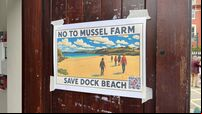Analysis: Delicate balancing act needed in Budget 25

Stephen Keohane, Partner at KPMG and Chair of the Cork Chamber Budget Committee, Minister for Finance Jack Chambers, Rob Horgan, President of Cork Chamber and Conor Healy, CEO Cork Chamber meeting at the Imperial Hotel, Cork to discuss the business landscape in Cork and priorities ahead of Budget 2025 this month. Photo: Darragh Kane
It’s important to bear in mind that there are actually two budgets going to be announced on October 1, one for revenue, or day to day spending and receipts, and the other for capital expenditure, on infrastructure projects.
The headline and the bottom line from this year’s budget has already been given away by Finance Minister Jack Chambers. In comments he made during the Fianna Fáil think-in in Killiney at the beginning of the week, the
finance minister said that workers would be approximately €1,000 better off as a result of the various budgetary adjustments he plans to announce on October 1.
In the context of the increasing cost-of-living, there’s been talk of a bonus social welfare payment in October as well as the customary festive double payment at Christmas — payments which will cost €300m each. The Green Party has also suggested a once off quadruple child benefit payment of €560 in the first month after a child is born, and this is likely to form part of the budget.
Last year, after the budget, there were a large number of once off payments — €300 for the fuel allowance, €400 for those in receipt of the Working Family Payment, €200 for those getting the Living Alone Allowance, €400 for those on Disability Allowance, Invalidity, and Blind Pensions as well as a €400 payment for those in receipt of the Carer’s Grant/Domiciliary Care Allowance. Expect a raft of similar payments for a range of recipients of social welfare .
While previously the rates of unemployment were elevated with hundreds of thousands out of work, now there’s almost full employment.
A bill to introduce pay-related Job Seekers’ Allowance was enacted during the summer which allows for a maximum weekly payment of up to 60%, or €450, for the first three months of unemployment. Will this be tinkered with come budget day? Unlikely given that the emphasis is very much on employment rather than unemployment.
In of income tax, the trend in recent years has been to leave rates as they are — at 20% and 40% — but to adjust the bands and increase tax credits to put more money back in the pockets of middle income earners in particular. Last year, for instance, the amount you could earn before you start to pay the higher rate increased by €2,000, up to €42,000. The likelihood is that, this year, there could actually be a rate reduction to add to tax band adjustments and increased credits.
Fine Gael, currently the lead party in Government and opinion polls, has made a reduction of income tax, a central plank of its policy, and the argument is that as we’re approaching full employment, the income to the State from tax will increase even if the rate is decreased as the burden is spread among more workers.
Last year also saw an increase of more than €2,000 in the threshold to qualify to pay the Universal Social Charge and a reduction from 4.5% to 4% in the rate. This was tempered by a fractional 0.1% increase in the PRSI rate. The USC is a hated hangover from the bailout era and could be reduced further in this budget, and this has been already openly hinted at by the finance minister.
It comes on the back of the closures of several high profile establishments, the proprietors of many of which cited high costs. There seems to be a degree of resistance to a reduction which the Government feels would have knock-on impacts as well as causing further complications for other sectors paying Vat.
The Government will have to introduce new s — or increase existing measures — to small and medium-sized businesses and hope that these proposals will halt the flow of closing businesses.
Measures such as the Increased Cost of Business Scheme, introduced last year, did not get universal from businesses and will have to be substantially improved if they are to assuage their anger if the Vat rates aren’t reduced.
Another targeted measure which could help parents whose children are in third-level education is the likely further reduction in registration fees payable to universities and colleges — last year it was reduced by €1,000 and a further €500 reduction is likely this year, bringing the student contribution to €2,500.
Given that the cost of on and off campus accommodation is fast becoming out of reach for more and more people, it would be a small compensating measure. However, the warning has been sounded by universities that they need additional funding — the figure of €200m+ is the ballpark of what’s being demanded — to ensure that a perceived decline can be halted.
At the other end of the education spectrum, while there was a 25% reduction in the cost of using full-time childcare services in last year’s budget and further reductions are likely.
The Government is likely to have to engage with the impacts this is having on the childcare sector, with a number of recent closures leaving many parents with children high and dry.
While parents have to pay less, the provider faces a heavy burden of paperwork to recoup the difference, and this is leading to frustration and financial difficulties.
As Fine Gael has proposed a publicly-funded childcare system as their ideal, this will take years to put in place and, in the meantime, pre-school children will still have to be cared for and the current system involving private providers is stretched to the limit.
Another difficulty the Government faces is a growing shortage of teachers at secondary and primary levels. Teachers gaining qualifications in Ireland are being lured overseas to Saudi Arabia and as far as Australia — where opportunities offering better salaries and chances to advance are plentiful.
Will there be a measure to counter this exodus in order to ensure that pupil teacher ratios in Irish schools, already too high, can be reduced further?
Waiting lists are increasing, if anything, and while the recruitment embargo has been lifted, the Department of Health will still require further funding just to stand still.
The recruitment issues affecting the education sector are mirrored in health. A medical doctor or nursing qualification in Ireland is highly valued internationally, meaning those who qualify are mobile.
The number of GPs is decreasing and will decline further as an ageing cohort retires. While bodies like the Irish College of General Practitioners are addressing the issues, the lure of a less pressurised and potentially more lucrative career overseas is tempting for newly-qualified medical professionals.
While there has been an increase in the recruitment of gardaí over the past year, the constant demand for more feet on the beat, especially in areas experiencing particular issues like Cork’s northside and, in recent months, areas like Charleville, will continue.
In recent interviews, Finance Minister Jack Chambers — who succeeded Brussels-bound Michael McGrath — has indicated that up to €3bn, sourced from the profits generated by the shares in Irish banks held by the State since the bailout years of 2008-10, will be dedicated to capital projects.
The reality is that he could spend €3bn in Cork alone without breaking a sweat.
Ireland’s infrastructure is in much need of funding to upgrade it — and is, according to Apple, in much need of an upgrade.
Apple called attention to what it regards as items like the lack of good roads, rail links, and the like in Cork in a meeting with the Government earlier this year.
The people of Cork know too well the need to upgrade the infrastructure. All we need to remind us is to turn on the tap and wait — and wait — until the brown water runs clear. There are varying estimates as to the cost of replacing the city’s 100-year-old cast iron pipe system — suffice to say, there won’t be much change from €500m.

Then there’s a list of at least 38 communities around the city and county in need of an upgraded waste water treatment system.
Take Carraig na bhFear, for instance, where 10 houses have lain empty for years because they cannot be connected to an overloaded waste water system in the village.
There was also some shock and disappointment a few weeks ago when it was hinted there wouldn’t be enough funding to immediately proceed with some major roads projects such as the N28 Cork to Ringaskiddy route or the N20 Cork to Limerick motorway — the increasing cost of material has led to a shortage of funds in the second half of the year.
Then there’s the drive to build more houses and each party trying to trump the other in of the number of social and affordable homes they can deliver.
That all means there will be a degree of Government investment to ensure homes are delivered at less than the market price.
Many of those houses are dependent on there being adequate wastewater treatment facilities in place.
This is a glimpse of what Cork needs in of infrastructural investment and it’s by no means a definitive list either.
There will be similar wish lists all over Ireland and TDs, as well as candidates, equally vociferous on behalf of their constituencies.
Defence spending is another area where the Government needs to bolster its position.
While Ireland is not a member of Nato, it is coming under increasing pressure to up its expenditure on defence, to retain existing personnel and recruit more, and to equip itself adequately.
So while the Government is not eager to dip into the approximately €14bn in back tax from Apple (€13bn plus the profits from the various bonds which the original sum was used to purchase when it was put into an Escrow back in 2016), the political reality is that it will have to come into its calculations in some way.
The likelihood is that it will form part of the budget speech, but will be earmarked for investment in the two funds set up when Michael McGrath, the then finance minister, announced the budget last year — the Future Ireland Fund to meet the costs associated with an ageing population, climate change challenges, digitalisation, other economic challenges, along with the Infrastructure, Climate, and Nature Fund.
The Apple windfall means this fund could be full sometime next year when the funds are finally transferred to the Irish Exchequer and, by that time, there should be a new Government in situ as the latest a general election can take place is February 2025. So the Apple fund will be that istration’s headache.
On the face of it, Ireland’s economy is performing well. However, it is vulnerable because of its dependence on foreign direct investment and the enormous employment provided by multi-nationals such as Apple, Google, Intel, and others. The high tech sector is volatile and mobile.
The budget, more than usual this year because of the imminent election, will challenge Finance Minister Jack Chambers and his public expenditure and reform Cabinet colleague Paschal Donohue to perform a delicate balancing act.
It needs to be a budget which delivers an immediate boost in their pockets to likely voters while not leaving the Government open to credible charges of attempting to bribe the electorate.







 App?
App?


